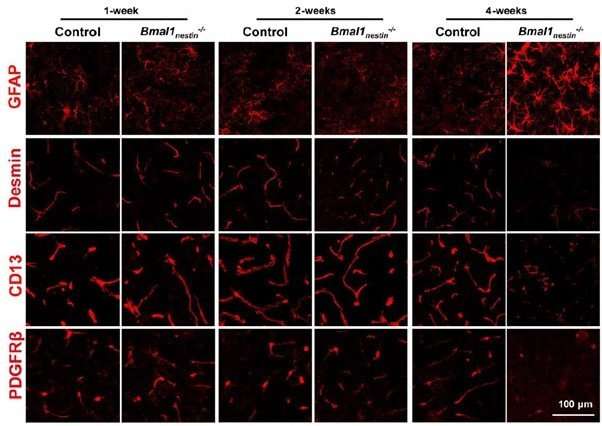Link between biological-clock disturbance and brain dysfunction found

Researchers at Okayama University report in the Journal of Neuroscience that a certain protein known to play a major role in circadian rhythmicity—humans' intrinsic 24-hour biological cycle—is also key to proper brain functioning. The findings may increase the understanding of neurological diseases and guide the development of future treatments.
Patients suffering from psychiatric or neurological diseases often have irregular sleep patterns. In fact, neurodegenerative diseases, such as Alzheimer's are believed to be caused by a disturbed biological response to the day/night cycle (a.k.a. circadian rhythm). A team of researchers led by Takeshi Takarada from Okayama University has now identified a link between circadian rhythm disturbance and brain dysfunction. The scientists showed that a protein called Bmal1, known to play an important role in circadian rhythmicity, also regulates the stability of the blood–brain barrier (BBB), a semipermeable membrane in the brain that separates blood from other, extracellular fluid.
Takarada and colleagues made their discovery by studying the function of Bmal1 in transgenic green-fluorescent-protein (GFP) mice. The introduction of GFP is a commonly used biomedical technique for obtaining fluorescence microscopy images—in this case, of the brains of mice. First, the researchers found that deletion of Bmal1 molecules results in an increased activity of astrocytes, a type of cell in the brain that provide biochemical support to the BBB. They then observed that Bmal1 deficiency leads to higher-than-normal permeability of the BBB due to pericyte dysfunction. Pericytes are cells needed to sustain proper BBB function; they regulate capillary blood flow.
As to the origin of the pericyte dysfunction causing reduced integrity of the BBB, the scientists were able to show that Bmal1 deletion affects the expression of platelet-derived growth factor receptor β (PDGFRβ) proteins in pericytes, which leads to a decrease in pericyte coverage of blood vessels in the brain. This reduced coverage was found to be age-dependent.
The work of Takarada and colleagues clearly establishes a connection between circadian rhythms and the physiological stability of the BBB: Bmal1 is involved in both. The scientists therefore concluded that "… Bmal1 may represent a novel target for the discovery and development of therapies for many neurodegenerative and/or psychiatric disorders related to abnormal BBB integrity."
A biological process showing a natural periodic cycle of 24 hours—an Earthly day—is called a circadian rhythm. The mechanism behind such processes, seen in plants, animals, fungi and certain types of bacteria, is called a circadian clock. In humans, circadian rhythm disturbances are associated with psychiatric diseases such as bipolar disorder and neurodegenerative diseases such as Alzheimer's disease.
An important molecular component of the circadian-clock mechanism is brain and muscle aryl hydrocarbon receptor nuclear translocator-like protein 1 (Bmal1); it regulates certain biochemical processes in the 24-hour cycle.
Takeshi Takarada and colleagues have now examined the role of Bmal1 in brain function, and found that reduced levels of Bmal1 affected the proper functioning of the blood–brain barrier (BBB), establishing a link between circadian rhythm disorders and neurological pathologies.
BBB
The blood–brain barrier (BBB) is a semipermeable membrane, separating blood circulating in the brain from other fluid in the central nervous system. It regulates the transit of water, certain gases and molecules like glucose and amino acids required for neural function. A properly functioning BBB features three particular types of cells: astrocytes, endothelial cells and pericytes. By looking at mice with a reduced Bmal1 content, Takarada and colleagues discovered astrocyte hyperactivity and pericyte dysfunction, with the latter compromising the integrity of the BBB.
More information: Ryota Nakazato et al. Disruption of Bmal1 Impairs Blood–Brain Barrier Integrity via Pericyte Dysfunction, The Journal of Neuroscience (2017). DOI: 10.1523/JNEUROSCI.3639-16.2017

















